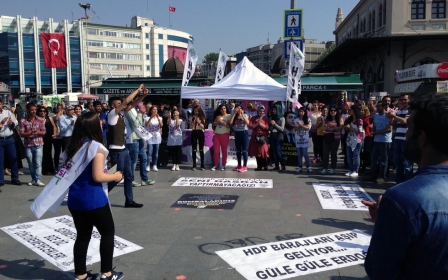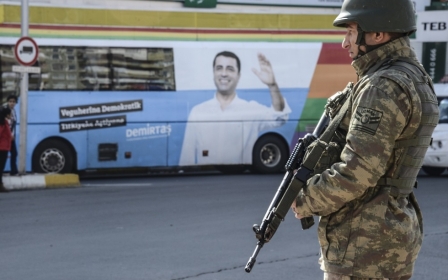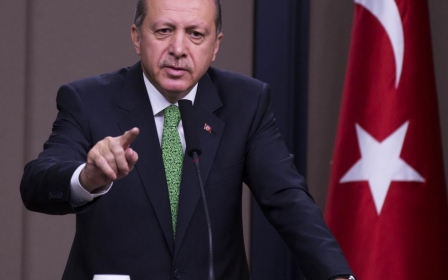At least 2 killed as explosion rocks HDP rally in Turkey

The deadly bomb blasts at an opposition rally in the southeastern province of Diyarbakir were an attack on Turkish democracy, Prime Minister Ahmet Davutoglu said late Friday.
The explosions at a Peoples’ Democratic Party (HDP) meeting on Friday afternoon killed at least two and injured more than 100 others, according to Turkey's culture minister.
However, journalist Mat Nashed, a contributor for Middle East Eye at the scene, said that four people had been killed. The opposition Zaman newspaper also said more than 150 had been injured.
Firat News Agency, a pro-Kurdish media outlet, also confirmed four dead while claiming as many as 350 people had been wounded.
The attack came two days before Turks go to the polls in a general election where the pro-Kurdish party could enter parliament for the first time.
“No matter why, whoever has done this attack, the perpetrators target Turkey and Turkish democracy,” Davutoglu, leader of the ruling Justice and Development (AK) Party, said in a late night interview on private KonTV.
He added that the bombings were carried out by “dirty hands” or “circles” that were aware of the “heavy consequences of such manipulations”.
On Saturday, hundreds of people chanted slogans in support of the pro-Kurdish HDP party during they marched in the funeral of one of the victims.
Initial reports suggest that two separate explosions occurred five minutes apart, shortly before party's leader Selahattin Demirtas was due to address the thousands of supporters who had gathered at the march ahead of the election slated for Friday, 7 June.
So far there is confusion about what exactly caused the incident, with some are suggesting that it could have been a faulty electricity distribution unit, although Energy Minister Taner Yıldız ruled out this claim.
"There was an external intervention to the power distribution unit," he said. "Our inspection has clearly showed that the source of the explosion was not the power distribution unit. Its door was damaged with pressure coming from outside to inside and not vice versa.”
Nashed, who attended the march said: "One sound happened first and everyone was not sure if this was supposed to be part of the rally and then immediately after, the next explosion took place and then panic was widespread throughout the entire rally. The blast was right in the middle, next to a mosque.
"For an electric blast, that’s a bit unusual, given the extent of damage and the number of people killed. The Union of Doctors is saying that four people have been killed and more than 100 injured. In the grand scheme of things, as far as attacks on HDP rallies being systematic…I think it was more intentional rather than accidental, but that’s yet to be confirmed."
Following the blast, Demirtas urged his supporters to remain calm and not "respond to provocations" adding that the blast’s cause had not yet been firmly established.
"It is thought-provoking that this incident has taken place before the election," Demirtas told Turkey's CNN Turk television from Diyarbakır. "Whatever the cause of the blast, I am calling on the people of Diyarbakır to keep calm."
Turkish Prime Minister Ahmet Davutoglu has vowed to apprehend those responsible.
"We will look into whether it is a power distribution unit explosion or an assasination [attempt], or any kind of provocation, and we will announce the result as soon as possible," he said.
"As we have caught the perpetrators of attacks against the HDP in the past, we will catch any perpetrators here.”
Steven Cook, a US specialist on Turkey from the Council on Foreign Relations, commented: "To state the obvious, someone is trying to provoke the Kurds into violence a few days before the elections."
After the incident some activists threw stones in anger at the police, with the security forces then using tear gas to keep control, AFP reported.
The rally was to have been one of the HDP's key campaign events, as Diyarbakir is the most significant city in the Kurdish-majority southeast that is the bedrock of its support.
The HDP has been targeted by several attacks ahead of Sunday's elections and clashes with Turkish nationalists at its rally in the eastern city of Erzurum on Thursday left dozens wounded.
According to the party, it has been violently targeted more than 70 times during the election campaign.
Earlier this week, unidentified gunmen opened fire on a HDP campaign bus in the Kurdish-majority eastern Bingol province, killing the driver.
In a tight campaign, the HDP is battling to exceed the tough 10 percent threshold required in Turkey to send MPs to parliament.
Should it succeed, the presence of HDP MPs could stymie plans by the ruling party to agree on a new constitution and to hand more power to President Recep Tayyip Erdogan.
"If I were the president, I would not only work to ensure that the HDP has a seat in the parliament, but all other [non-represented] parties as well. It is important that all parts of the society have representatives [in the parliament]," Demirtas said after the blast.
"Otherwise, those who are left out - and we have been left out for years, and know the pain - would not feel like the parliament belongs to them. And when they feel that way, they start seeking other means, which would create tension in the society."
Demirtas said that the current election threshold was not just the HDP's problem, but "of about 25 parties which are not represented in the parliament".
"When the HDP surpasses the threshold, this will mean an increase in people's faith in democratic politics, and freedom of religion, and identity," he said, adding that the only reason they were in politics was to prevent violence from becoming those "other means".
Translation: Banging on pots, ululations, turning lights on and off in Amed in protest of the two explosions that targeted the HDP
Kurdish political support has been split between the ruling AKP - who have appealed primarily to conservative Kurdish Sunni Muslims - and the HDP who, in addition to backing increased Kurdish autonomous rights, have also pushed sociali liberal policies that support LGBT, women's rights and rights for other Turkish minorities.
Middle East Eye propose une couverture et une analyse indépendantes et incomparables du Moyen-Orient, de l’Afrique du Nord et d’autres régions du monde. Pour en savoir plus sur la reprise de ce contenu et les frais qui s’appliquent, veuillez remplir ce formulaire [en anglais]. Pour en savoir plus sur MEE, cliquez ici [en anglais].




